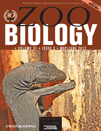
ZOO BIOLOGY
Scope & Guideline
Elevating the discourse in animal science and conservation.
Introduction
Aims and Scopes
- Animal Welfare and Behavior:
Research aimed at understanding and improving the welfare of zoo animals, including studies on behavioral enrichment, social dynamics, and the effects of environmental factors on animal behavior. - Conservation and Breeding Programs:
Investigations into captive breeding techniques, genetic management, and conservation strategies for endangered species, with a focus on enhancing survival rates and genetic diversity. - Veterinary Care and Health Management:
Exploration of health management protocols, veterinary care techniques, and nutritional requirements for various species in captivity, aimed at improving overall animal health. - Public Engagement and Education:
Studies examining visitor interactions with animals, educational programs, and the impact of zoos on public perceptions of wildlife conservation and animal welfare. - Ecological and Environmental Impact:
Research assessing how zoo environments affect animal behavior and health, including the influence of habitat design and enrichment on species-specific needs.
Trending and Emerging
- Use of Technology in Animal Management:
Emerging studies utilize advanced technologies such as remote monitoring, genomic analysis, and digital enrichment tools to enhance animal welfare and management practices. - Interdisciplinary Approaches to Animal Welfare:
There is a growing trend towards integrating psychology, sociology, and ecology in research to better understand animal welfare and improve zoo practices. - Focus on Behavioral Health and Enrichment:
Increased emphasis on understanding the psychological and behavioral needs of animals in captivity, including the impact of enrichment and social structures on well-being. - Conservation Psychology and Visitor Engagement:
Research exploring the psychological effects of zoo visits and educational programs on conservation attitudes and behaviors, highlighting the role of zoos in fostering public engagement. - Innovative Reproductive Technologies:
Emerging studies on reproductive management techniques, such as artificial insemination and genetic preservation, are gaining importance in the context of species conservation.
Declining or Waning
- Traditional Taxonomic Studies:
There has been a noticeable decline in research strictly focused on taxonomy and classification in favor of studies that integrate behavioral, ecological, and genetic perspectives. - Exclusively Theoretical Approaches:
Papers that focus solely on theoretical frameworks without empirical data are less frequently published, as the journal increasingly values evidence-based research. - Single Species Studies Without Broader Implications:
Research that examines single species in isolation, without considering broader ecological or conservation implications, is becoming less common as interdisciplinary approaches gain traction.
Similar Journals
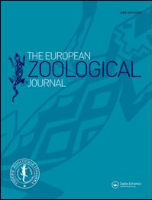
European Zoological Journal
Advancing the Frontiers of Animal ScienceEuropean Zoological Journal, published by Taylor & Francis Ltd, is an esteemed open-access publication dedicated to advancing the exciting field of zoology. Since its inception in 2017, this journal has progressively established itself as a vital resource for researchers, professionals, and students alike. With its Q2 ranking in Animal Science and Zoology as of 2023, the journal ranks in the 69th percentile among its peers, showcasing its influence and contribution to the discipline. The journal’s broad scope covers a wide range of topics within zoology, aiming to foster an understanding of animal biology and conservation efforts. As an open-access journal, it not only enhances the dissemination of knowledge but also encourages collaborative research across global communities. Situated in the United Kingdom, the European Zoological Journal invites submissions that contribute to the evolving discourse in animal sciences, and endeavors to support the scientific community in addressing pressing ecological challenges.

Journal of Zoological and Botanical Gardens
Unlocking Insights into Ecological and Conservation StrategiesJournal of Zoological and Botanical Gardens, published by MDPI, serves as a leading platform dedicated to the interdisciplinary exploration of both zoological and botanical research. With its base in Switzerland, this open-access journal fosters global accessibility, allowing researchers and professionals to disseminate and engage with cutting-edge studies and findings in the realms of agricultural and biological sciences, as well as veterinary sciences. Holding a commendable Q2 ranking in both categories (2023) and positioned in the 68th percentile for agricultural and biological sciences (rank #61/193) and 67th percentile for veterinary studies (rank #12/35), it reflects the high quality and relevance of the publications. The journal covers a range of topics from ecological assessments to conservation strategies, aiming to bridge the gap between wildlife management and plant sciences. Researchers, professionals, and students alike will find valuable insights and opportunities for collaboration within its pages. The journal’s commitment to fostering innovative research makes it an essential resource for anyone interested in the dynamic interactions between flora and fauna.

CANADIAN JOURNAL OF ZOOLOGY
Empowering the Study of Life Through Comprehensive ResearchWelcome to the Canadian Journal of Zoology, a leading academic journal in the fields of Animal Science and Zoology as well as Ecology, Evolution, Behavior and Systematics. Published by Canadian Science Publishing since 1965, this esteemed journal serves as a vital platform for researchers, professionals, and students to disseminate and engage with significant findings in zoological and ecological research. With an impact factor placing it in the Q2 category and rankings reflecting its influence (201/490 in Animal Science and Zoology; 372/721 in Ecology), the journal is committed to advancing the understanding of animal biology and environmental interactions. Although currently not an open access publication, it provides comprehensive resources and studies that are crucial for the academic community. Based in Ottawa, Canada, the journal continues to push the boundary of knowledge right up to 2024 and beyond, making it an essential resource for anyone dedicated to the life sciences.
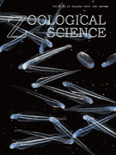
ZOOLOGICAL SCIENCE
Cultivating Knowledge for a Sustainable FutureZoological Science, published by the Zoological Society of Japan, is a leading journal dedicated to the fields of animal science and zoology. With its ISSN 0289-0003, this respected publication has established itself as a prominent source of scientific research, attaining a commendable Q2 ranking in the 2023 category of Animal Science and Zoology. Spanning over three decades, from 1992 to 2024, the journal offers a valuable platform for scholarly articles that explore various aspects of zoology, including ecology, behavior, and evolutionary biology. Although it operates under a traditional subscription model, its contributions are supported by a robust community of researchers and professionals who value its insights. The journal strives to foster academic discourse and insights that drive understanding and conservation of wildlife, making it an essential resource for students and established experts alike. The publishing headquarters located in Tokyo, Japan, further enhances its international reach and influence in zoological studies.

ANIMAL BIOLOGY
Bridging Research and Ecological Awareness in Animal BiologyANIMAL BIOLOGY is a distinguished journal published by BRILL, focusing on the dynamic fields of Animal Science and Zoology, as well as Ecology, Evolution, Behavior, and Systematics. With an ISSN of 1570-7555 and an E-ISSN of 1570-7563, this quarterly journal serves as a pivotal platform for researchers and professionals seeking to contribute to the understanding of animal biology across diverse ecological contexts. The journal is recognized with a 2023 Scopus ranking of #234 out of 490 in the Animal Science and Zoology category, placing it within the 52nd percentile, alongside a rank of #409 out of 721 in Ecology, marking a solid contribution to the field. Although it currently holds a Q3 quartile in both categories, its commitment to quality research and novel insights continues to bolster its significance within the academic community. The open access option coupled with its publication history from 2003 to 2024 ensures a wide dissemination of knowledge, drawing in a global audience of researchers, professionals, and students eager to explore the intricacies of animal biology. By promoting high-quality discussions and innovative studies, ANIMAL BIOLOGY plays an essential role in advancing the understanding of life sciences and the evolution of biodiversity.

PAKISTAN JOURNAL OF ZOOLOGY
Innovating animal biology insights from Pakistan and beyond.Pakistan Journal of Zoology, established in 1975 and published by the Zoological Society of Pakistan, is a pivotal resource in the field of zoology and animal science, contributing to the academic discourse and research advancements in the region. With an ISSN of 0030-9923, this journal strives to disseminate innovative research findings and scholarly articles that explore various facets of animal biology, ecology, and conservation. Although classified in the Q4 quartile within the animal science category, its commitment to providing a platform for emerging researchers makes it crucial for those in the zoological community. The journal covers a broad range of topics relevant to contemporary issues in zoology, promoting both local and international collaborations. Situated in Lahore, Pakistan, its contributions are vital for promoting biodiversity awareness and conservation efforts within the region. Accessible research outputs empower students and professionals alike to engage in critical discussions and applications within the disciplines of zoology and animal science.
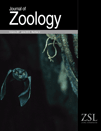
JOURNAL OF ZOOLOGY
Exploring the wonders of zoological sciences since 1830.JOURNAL OF ZOOLOGY, published by Wiley, stands as a premier scholarly journal in the fields of Animal Science and Zoology, renowned for its outstanding contributions to the knowledge of animal biology and ecology. With an impressive impact factor and a strong ranking in the Q1 category for Animal Science and Zoology, as well as Q2 for Ecology, Evolution, Behavior, and Systematics, the journal rigorously engages with both foundational research and groundbreaking discoveries since its inception in 1830. Located in Hoboken, New Jersey, this journal is dedicated to fostering the academic community's understanding of zoological sciences, providing access to important research that shapes wildlife conservation efforts and ecological studies. Although the journal does not currently offer open access options, it continues to attract significant attention, as evidenced by its strong Scopus rankings in related categories. Researchers, professionals, and students will find invaluable resources in the JOURNAL OF ZOOLOGY to advance their understanding of animal life and the ecological challenges it faces today.

SPIXIANA
Cultivating a Deeper Understanding of Zoological SciencesSPIXIANA is a distinguished journal dedicated to the fields of animal science and zoology, published by VERLAG DR FRIEDRICH PFEIL in Germany. With the ISSN 0341-8391, it has been contributing to the scientific community since its inception, with volumes converging from 2008 to 2024. Although currently listed in the Q4 quartile of the 2023 category rankings for Animal Science and Zoology, it provides a vital platform for researchers and professionals to disseminate significant findings in the field. Despite being unindexed in open access, SPIXIANA ensures that vital research reaches its audience, enhancing academic discourse and furthering our understanding of zoological sciences. Its commitment to sharing rigorous scientific research make it an important resource for anyone passionate about animal biology and conservation.

AUSTRALIAN JOURNAL OF ZOOLOGY
Bridging Research and Conservation for Wildlife SuccessAustralian Journal of Zoology, published by CSIRO PUBLISHING, serves as a premier platform for research in the fields of animal science and zoology, with a profound commitment to advancing our understanding of wildlife and ecosystems. Featuring an ISSN of 0004-959X and an E-ISSN of 1446-5698, this esteemed journal encompasses a wide range of topics relevant to ecology, evolution, behavior, and systematics. For the year 2023, it holds a commendable Q2 ranking in both Animal Science and Zoology and Ecology, Evolution, Behavior, and Systematics, demonstrating its significant impact within the academic community. With a rich publication history spanning from 1952 to 2024, the journal caters to researchers, professionals, and students by disseminating crucial findings and methodologies that contribute to effective conservation efforts and informed ecological practices. Although not an open access journal, it continues to foster collaboration and discussion among scholars in Australia and beyond. Located in Clayton, Victoria, the journal remains dedicated to its objective of enhancing knowledge in zoological sciences and addressing vital environmental challenges.
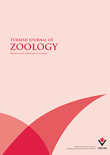
TURKISH JOURNAL OF ZOOLOGY
Championing Scientific Rigor in ZoologyThe TURKISH JOURNAL OF ZOOLOGY, published by the esteemed Tubitak Scientific & Technological Research Council Turkey, serves as a pivotal platform for the dissemination of research in the field of zoology and animal science. With an ISSN of 1300-0179 and an E-ISSN of 1303-6114, this journal has been contributing to the scientific community since its inception in 1994 and will continue to do so through 2024. Renowned for its scientific rigor, the journal holds a Q3 ranking in the 2023 category of Animal Science and Zoology, placing it within the prominent ranks of Scopus with a current percentile of 56, and an overall rank of 214 out of 490 in its domain. As an essential resource for researchers, professionals, and students, the journal prioritizes quality research, fostering knowledge exchange and collaboration among scholars worldwide. With its commitment to advancing understanding in zoological sciences, the TURKISH JOURNAL OF ZOOLOGY stands as a significant contribution to the global scientific dialogue.